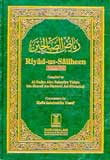Riyad Us-Saliheen (Gardens of the Righteous)

Chapter 276
Prohibition of Deceiving others
Allah, the Exalted, says:
"And those who annoy believing men and women undeservedly, bear on themselves the crime of slander and plain sin.'' (33:58)
1579. Abu Hurairah (May Allah be pleased with him) said: The Messenger of Allah (PBUH) said, "He who takes up arms against us is none of us; and he who cheats us is none of us.''
[Muslim].
Another narration of Muslim is: The Messenger of Allah (PBUH) happened to pass by a heap of corn. He thrust his hand in that (heap) and his fingers felt wetness. He said to the owner of that heap of corn, "What is this?'' He replied: "O Messenger of Allah! These have been drenched by rainfall.'' He remarked, "Why did you not place this (the drenched part of the heap) over the corn so that people might see it? He who deceives is not of us.''
Commentary:
1. To take arms here signifies to revolt against the Muslim community (and a Muslim government, for that matter) or draw a sword, gun, etc., to kill a Muslim - a common practice in the present-day terrorism.
2. Forgery and deceit have two different forms; one is implied and other is physical and visible. In the former, falsehood is given a veneer of truth. The latter is concealment of some defect, adulteration of some inferior quality merchandise in a superior one, addition of something to increase weight or volume or a substance by unfair means and other malpractices.
3. "He is none of us'' means "He is not following the way of Muslims'' or "His conduct is unlike that of Muslims.'' It is therefore, necessary for every Muslim to abstain from such evils.
1580. Abu Hurairah (May Allah be pleased with him) said: The Messenger of Allah (PBUH) said, "Do not practise Najsh (to cheat).''
[Muslim].
Commentary: This Hadith has already been mentioned (Hadith No. 1591). Najsh means to offer a high price for something in order to allure another customer who is interested in the thing. If a person has no intention of purchasing a thing which is being auctioned, one should not give a higher bid for it because its genuine customer will be deceived by it, and he will purchase it at a higher price. This is also a form of deceit which must be strictly avoided.
1581. Ibn `Umar (May Allah be pleased with them) said: The Messenger of Allah (PBUH) prohibited the practice of Najsh.
[Al-Bukhari and Muslim].
Commentary: This Hadith tells us that one should not make an offer of a higher price if one has no intention of buying it because that will be a fraud. For this reason this practice has been forbidden.
1582. Ibn `Umar (May Allah be pleased with them) said: A man mentioned to the Messenger of Allah (PBUH) that he was often deceived in dealings. The Messenger of Allah (PBUH) said to him, "When you enter into a transaction you should say: "There should be no deception.'''
[Al-Bukhari and Muslim].
Commentary: The words mentioned in the Hadith for the customer are meant to protect his right, implying that if there is something amiss in the bargain, he will have the right to return the commodity purchased by him. The seller will have to respect this right of the buyer.
1583. Abu Hurairah (May Allah be pleased with him) said: The Messenger of Allah (PBUH) said, "He who deceives another's wife or his slave is none of us.''
[Abu Dawud].
Commentary: To incite or provoke someone's wife or slave against her husband or his master or to create hatred between the two is a great crime, because a Muslim is required to create peace and accord amongst people. It is against his conduct to foment dissension and discord between them.
